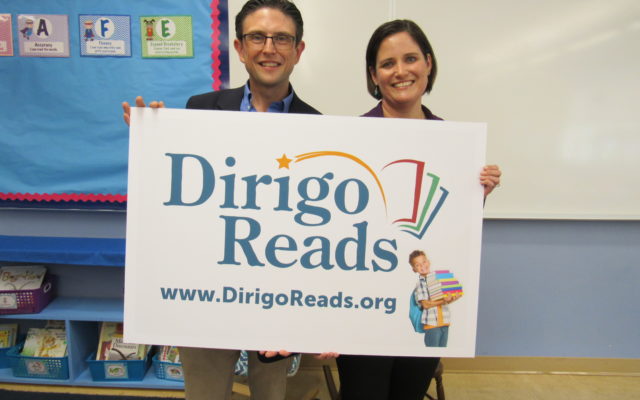
Maine’s first-graders are getting more books thanks to new literacy program
For both Dan and Karen Cashman, childhood revolved around books. With mothers who were librarians, they were each exposed to reading at an early age. They devoured timeless favorites like Ramona Quimby and the Berenstain Bears as well as authors like Roald Dahl.
But the couple realizes that not all kids are growing up with those same opportunities.
“Everybody around here had … book order [forms],” Dan Cashman said. “I specifically remember there were always a few kids who weren’t part of that.”
They hope to change that.

Photo courtesy of Lisa Sturgeon/Sutherland Weston
DIRIGO READS — Dan and Karen Cashman launched their program Dirigo Reads Aug. 22. The program aims to give a free book a month to every first grader in the state by 2025.
The Cashmans officially launched their new program Dirigo Reads at the end of August. The goal of the program is to help the wellbeing and health of children in Maine through literacy. They aim to provide all first graders in six Maine towns with a book each month, with the overall goal to expand the program to all first graders in the state by 2025.
The six towns in the program this year include Dover-Foxcroft at the SeDoMoCha Elementary School along with Brewer, Caribou, Castine, Machias and Madison — serving six schools and 332 first graders in total.
Dirigo Reads has been in the planning stages for almost a year, Karen Cashman said. She saw a lot of teachers who were asking people to sponsor kids in the classrooms to provide books for them, so she wanted to see if that could work on a “macro level.”
The Cashmans discussed the logistics of the program with people in the Brewer school system, the now-former superintendent Cheri Towle, teachers and agencies to get a concrete plan for how the program was going to work. They discussed potential book titles to give to the students which will include a mix of fiction, non-fiction and poetry books such as “It’s Snowing, It’s Snowing,” by Jack Prelutsky.
The students will keep every book and will not have to return them at the end of the school year.
“There’s something special with having a book to keep,” Dan Cashman said. “Every year, they will have a home library of 9 to 10 books that they can keep forever.”
Brewer Community School is the largest school in the program with five first grade classrooms and 100 students. Castine’s Adams School is the smallest with two students.
“Above and beyond improving academic achievement, we also want our students to learn to love to read, and it is undeniable that children with greater access to books and print express more enjoyment of books, reading and academics,” said Allison Kahkonen, a principal at Brewer Community School at the Dirigo Reads launch. “What is so great about this program, is that by increasing access to high quality books for all kids, every month, during a critical year for literacy development, we can do both.”
The Cashmans concluded from their studies that the most successful way to increase students’ achievement is to increase their access to books. According to a 2018 study by Educate Maine, 22 percent of economically disadvantaged fourth graders were proficient in reading compared to 49 percent of non-economically disadvantaged.
“The thing about literacy, it plays a huge role in helping their wellbeing,” Karen Cashman said. “It will help people feel more confident in themselves and will help in the future.”
According to a 1991 study by the Carnegie Foundation for the Advancement of Teaching, there is almost a 90 percent probability that a child will remain a poor reader at the end of fourth grade if the child is a poor reader at the end of first grade. And while Maine’s fourth grade math scores have improved, said a 2014 study by Educate Maine, reading scores have basically been stagnant.
“There’s a big emphasis on STEM [science, technology, engineering and mathematics], but without the basic foundation of reading, STEM becomes a lot more difficult,” Dan Cashman said. “To help lay that foundation through books, to teach people to learn, and for enjoyment, helps propel things along.”
Karen Cashman said that first graders were the prime age to receive books from the program because they are at the age when their reading starts to advance, but they are not getting new books or they outgrow the ones they got when they were toddlers.
“It’s when they’re learning to read instead of reading to learn,” she said.
Parents of two daughters, Karen Cashman said her now-second-grader served as an inspiration for the program. She saw her literacy skills in first grade and saw the amazing progress that students can make in their reading over the course of the year.
Community supporters of Dirigo Reads are Cross Insurance, Sutherland Weston Marketing Communications, Bangor Savings Bank, the United Way of Eastern Maine and Machias Savings Bank.
The Cashmans realize that providing books to 13,000 students per month by 2025 is a lofty goal, but they are determined to get the support and find a way to achieve it. They are already looking into 2020 and will see how many schools they can add to the program each year. But their main goal is to give back to the community no matter what the numbers show.
“The program is about sharing optimism,” Karen Cashman said. “We hope it will inspire other schools or towns to do things to help their own communities.”